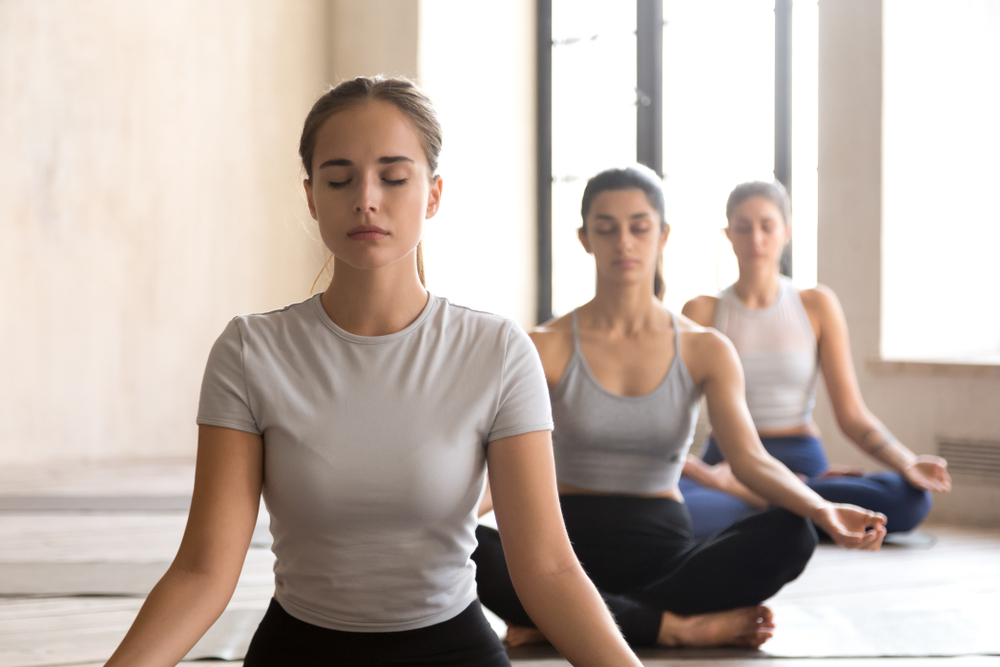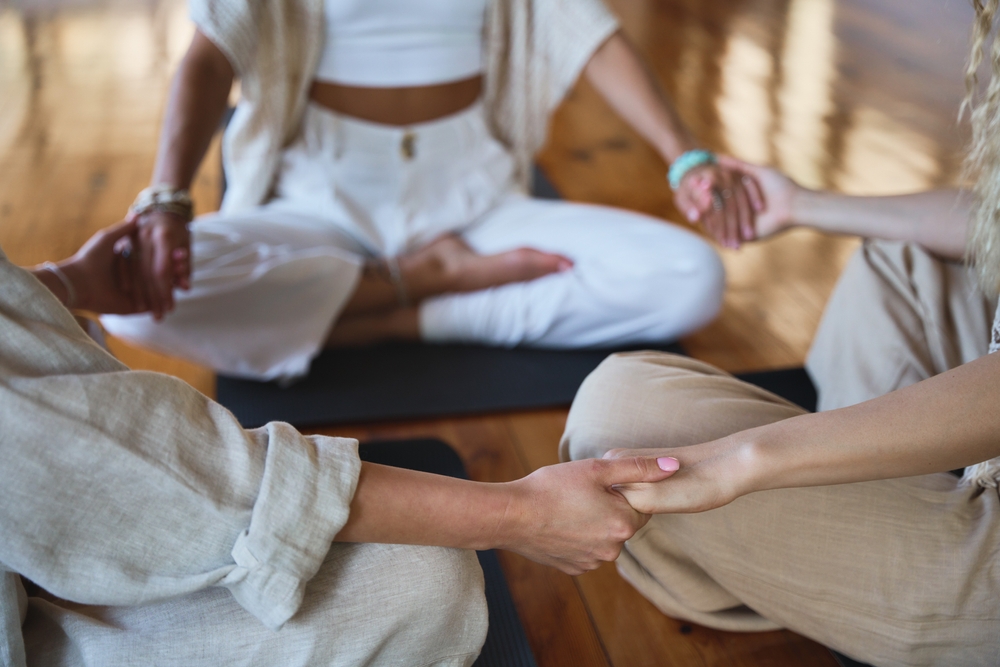Last Updated:
September 17th, 2025
Yoga Therapy | Addiction Treatment Therapies
When most people hear the word “yoga,” they think of trendy classes, tight clothes and impossible poses. But yoga therapy for addiction has nothing to do with bending yourself in half or sweating through a session. Yoga is about helping you reconnect with your body after addiction has pulled you away from it, complementing other rehab therapies. Many treatment programmes offer yoga therapy as a gentle, body-based approach to healing that supports you through the emotional ups and downs of recovery. You don’t have to be super flexible, and you don’t even need any yoga experience. Yoga therapy is safe and fun and can have huge benefits for everyone undergoing addiction treatment.
What is yoga therapy?
Yoga has been practised in India for thousands of years as a way to connect the body, mind and spirit. The name “yoga” itself means “to unite” in Sanskrit, and traditional yoga includes physical movement, breathwork, reflection and meditation. Over time, various traditions emerged, with some focusing on slower, mindful movement and others offering more intense and fluid movement.
Over the past few decades, yoga has become increasingly global, with people utilising it for stress relief, increased flexibility, or to carve out a quiet moment in a busy day. It is available at thousands of yoga studios across the UK and even on YouTube, where there are countless yoga channels to follow.
Yoga therapy, however, offers something deeper. Rather than just focusing on what your body can do, yoga therapy is about how your body feels, providing a quiet, supportive way to work through the emotional weight of addiction, anxiety or trauma.
Through soft movement, steady breath and guided stillness, yoga therapy helps soothe your nervous system and bring a sense of calm to your mind. This is very important because co-existing problems with mental health and addiction are very common. Yoga therapy can help quiet a racing mind, calm a tense body and ease overwhelming anxiety or frustration.
Struggling with an addiction? If you are ready to seek help, reach out to us today, and a member of our compassionate team will help you find the best option for starting your recovery journey.
What is the process for yoga therapy?
Yoga therapy is part of the emotional and physical healing process in recovery. It usually follows detox, which helps break physical dependency and clears all drugs, alcohol and toxins from your body. After that, you can begin deeper rehab treatment work with yoga therapy, gently supporting some of the tougher therapies.
A typical yoga therapy session lasts around an hour and can be done one-on-one or in a small, quiet group. You will usually start by focusing on your breath and then easing into simple stretches or poses that are adapted to how you’re feeling that day. Some sessions may also include guided meditation or imagery, helping calm racing thoughts or lift low moods.
After your session, your therapist may suggest a few easy things to practise on your own, like a calming breath before bed or a grounding pose for tough days. In recovery, it is easy to feel mentally, emotionally or physically stuck. Each yoga therapy session is designed to build upon the last one, helping to release what has been held in for too long. There is no need to rush or force anything. Just breathe, move gently and let healing happen in its own time.
How is yoga used in addiction treatment?
Addiction recovery doesn’t follow a strict formula, but yoga is one of those rare tools that works alongside almost anything else. For example, cognitive behavioural therapy (CBT) helps shift your mental habits, while yoga helps calm physical stress your body carries and slows things down so you can feel the benefits of CBT.
Yoga can also make group therapy less intimidating. If you get nervous or become shy in social settings, a little bit of movement and laughter can make a big difference. Yoga therapy often brings a lighter energy to rehab, helping people relax, connect and feel more comfortable opening up.
In 12 Step work, yoga can quietly echo many of the programme’s themes of surrender, discipline and mindful awareness. Moving gently, breathing steadily and showing up even when it’s hard can support those values and help you carry the 12 Steps off the page and into real life.
What benefits does yoga therapy offer?
Yoga therapy offers numerous benefits during recovery, including easing cravings, helping you relax after a tough day in rehab, and improving your overall mood and focus. Addiction takes a toll on your body and mind, but when you step onto the mat, you enter a space where you can slow down and breathe. Yoga therapy helps build physical strength, but it also strengthens your inner resilience, that quiet part of you that helps you stay committed even when things feel messy or hard.
Yoga is just as useful after you have finished rehab, giving you something reliable to return to when life gets busy or overwhelming again. It helps you sleep better, feel less reactive and stay emotionally balanced, all of which are vital as you make the transition back to everyday life.
In fact, many people who begin yoga in rehab make it a pillar of their relapse prevention plans after they leave. Some follow along with a YouTube video, and others join a class, which can be a great way to meet new, healthy-living friends.
Yoga therapy in private/free addiction treatment
Yoga therapy is usually only available through private rehab centres. While many NHS or community-based addiction services offer excellent care, they often don’t have the funding or resources to include holistic treatments like yoga therapy. That means if you’re looking to include yoga therapy in your recovery journey, you’ll most likely find it through private treatment.
Addiction Helper is part of UKAT, one of the UK’s leading providers of private addiction treatment. As part of our holistic approach to recovery, we offer yoga therapy at several of our centres. This practice has helped countless individuals feel more centred, reduce anxiety, and reconnect with themselves during the healing process.
Seek treatment for your addiction today
Change starts with one small decision, and if addiction has taken over your life, now is the time to reach out. At Addiction Helper, we are here to listen to your story, understand your needs and find a treatment path that’s right for you. Contact us today and see how yoga therapy can benefit your recovery.
Our compassionate team are ready and available to take your call, and guide you towards lasting the lasting addiction recovery you deserve.
Frequently Asked Questions
(Click here to see works cited)
- Khanna, Surbhi, and Jeffrey M Greeson. “A narrative review of yoga and mindfulness as complementary therapies for addiction.” Complementary therapies in medicine vol. 21,3 (2013): 244-52. doi:10.1016/j.ctim.2013.01.008
- Kuppili, Pooja Patnaik et al. “Role of Yoga in Management of Substance-use Disorders: A Narrative Review.” Journal of neurosciences in rural practice vol. 9,1 (2018): 117-122. doi:10.4103/jnrp.jnrp_243_17
Rekhi, Sukhman. “Somatic Yoga: Benefits, Practices, and Tips.” Health, 21 November 2024, https://www.health.com/somatic-yoga-8731678. Accessed 2 June 2025.



